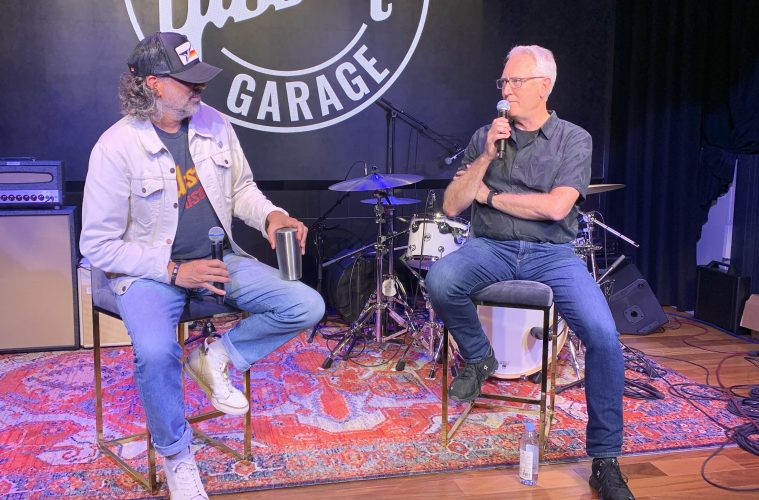Gibson Brands hosted a special event on July 14, the night before Summer NAMM began, to introduce the Gibson Garage on 10th Street in downtown Nashville. “What Orville Gibson started 127 years ago was something even he could not have imagined,” James ‘JC’ Curleigh, CEO of Gibson, said during the event. “One of the things we often talk about at Gibson is how can we make Orville proud? I am pretty sure if he were here now, he would be proud of what we have all accomplished. … We had a mission. Restore Gibson back to its iconic glory. We did not take that lightly. There were times we took a left when we should have taken a right, but we kept on track. Our mission was to be the most loved and played guitar brand again. That’s who we were. That’s who we are.”
Curleigh brought out a special guest to join the Gibson Garage celebration: Joe Lamond, president and CEO of NAMM. While Gibson is 127 years old, NAMM clocks in a similar 120 years of existence. Curleigh asked Lamond to sum up the past 120 years for NAMM. “If there is any one word I can use to sum up 120 years, it is passion,” said Lamond. “We are all unsuited for any other occupation. Except you [JC]. The rest of us are hopeless [laughs]. This is what we love, do and believe in. Passion and change are the two things that have stuck with us the whole time.”
Lamond added how great it was to see a large audience at the event who had made it through the worst parts of the pandemic. “The end of last March, many [retailers] probably said, ‘Oh my, we are in trouble.’ We are now all together. We put a stake in the ground. We put the band back together. We came back to Nashville. The pandemic is not over yet, but we are here. The family is back together.”
MI has both an opportunity and an obligation to keep the energy for guitar buying going that was brought on by the COVID-19 pandemic, noted Curleigh. “If someone told me in 2020 that there would be a terrible situation that would lead to a dynamic shift of energy for your industry, your fans, and every guitar brand, I would not know what that would look like,” he said. “We now know what that looks like. We have more guitarists engaging in guitar in the last 15 or 16 months than probably the last 15 years. How do we take advantage of that, not just in the music industry, but how do we become culturally relevant across industries? We have a chance to do that.”
Everyone in the MI industry is transformed by being a part of it, Lamond responded. “We are creating a changed human being for every person whom we put an instrument in their hands,” he said. “Everyone likely has a story and can remember to this day when you first played an instrument or opened the case. … “We have an opportunity to create a lifelong music maker at that moment. We also have the opportunity to turn someone off. Choose the former.
“We can change a human being every time we put a guitar or drum sticks in their hands. We get to do that every day. That has to be the coolest job in the entire world,” Lamond continued. “That is the future. No matter if there are pandemics or economic recessions, every day we get to do that, regardless of the conditions. For 5,000 years of recorded history, people have made music. Based on that, we have a really good shot of this continuing a bit further if we do our jobs right.”


